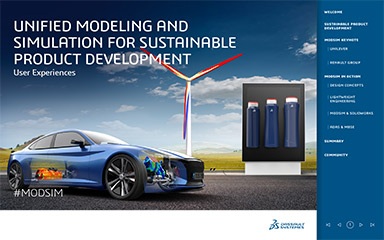Sustainable Product Development Gains Momentum
New Protolabs report finds engineers drawn to sustainable design practices, but there’s still work to be done to develop lasting corporate focus.

The DMLS printing process eliminates waste because any unused powder can be re-used for future builds. Image Courtesy of Protolabs
January 22, 2022
It's not just lip service—companies are finally starting to take some real action around sustainability, making changes to product development processes, including the implementation of new materials and technologies to help achieve their enterprise goals.
That’s according to Protolabs’ Sustainability Report 2022, which surveyed 200 engineers, product designers, and other leaders to gain insight into trends. The report found that the lion’s share of respondents (90%) said their organizations have made notable corporate changes over the last two years that have led to incorporating sustainability goals as part of their core design objectives. In addition, 80% of engineers said that sustainability had a defined role in their company as either part of the product development process or integrated into everyday programs. Seventy percent of respondents said they have been involved with sustainability at some level for more than six years.
As part of their evolution, survey respondents are adopting a variety of technologies and practices to propel sustainability efforts. For example, 68% of survey respondents are looking to AI and design for sustainability practices as key enabler in addition to integration of electronics. Sustainable packaging was a primary area for 62% of respondents. In terms of process change, nearly half of those surveyed (47%) are embracing closed-loop product development processes while 40% see additive manufacturing technologies as a huge facilitator of sustainable design.
“Lightweighting continues to be a major focus, especially for aerospace and automotive customers where every ounce counts in terms of fuel efficiency,” notes Eric Utley, technical engineer with Protolabs. “3D printing allows us to consolidate the production of parts using a more sustainable additive process.”
Specifically, Protolabs sees powder bed technologies like MultiJet Fusion, Direct Metal Laser Sintering (DMLS) and Selective Laser Sintering (SLS) as especially beneficial for advancing sustainability goals. “They allow you to eliminate material waste because any unused powder in a build can be re-used in new builds,” Utley says. “This is especially true for DMLS when you compare it to CNC machining and the material waste is significantly less.”
The survey also found sustainability means different things to different organizations. Seventy-nine percent of companies said they consider sustainability a culture or product development initiative while 21% view sustainability as a mandate to do the right thing. Individuals responsible for setting sustainability strategy have more confidence that any related implementations will be successful than those responsible for actually carrying out the work.
Specific sustainability targets or goals tend to vary by industry. For example, automotive respondents see meeting government regulations as their top challenge, while medical device companies have regulatory compliance as well as making manufacturing processes more sustainable and safe as their primary goals. When it comes to actual design goals, aerospace manufacturers cited fuel-related concerns as their primary sustainability target while medical device makers want to leverage AI in design as part of their sustainability agenda.
Universally, Utley says companies are closely evaluating their supply chain for opportunities to increase sustainability at every step in the product development process. “Digital manufacturing will allow for virtual product iteration and on-demand production—benefits over traditional manufacturing methods,” he explains. “The ability to offer on-demand production allows companies to produce only the parts they need when they need them. That lets them eliminate their reliance on warehouse storage and excess parts due to the shifting market demand.”
While companies are definitely making strides, challenges remain—especially the overall corporate attitude towards sustainability. Respondents said sustainability initiatives tend to be driven by regulations and fiscal concerns, yet nearly a third said their company still hadn’t established sustainability-related KPIs.
Check out this video to learn how Protolabs is advancing sustainability at one of its manufacturing plants through solar power.
More Protolabs Coverage
Subscribe to our FREE magazine, FREE email newsletters or both!
About the Author
Beth Stackpole is a contributing editor to Digital Engineering. Send e-mail about this article to [email protected].
Follow DE





